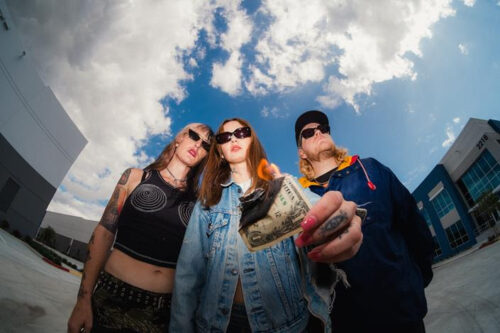
Woodward and Beeson met while working at an independent venue in downtown LA, where they bonded over a shared love of dark underground music. For years, Woodward had been making heavy synthesizer sequences in between writing hardcore and metal songs for his other bands, and experimenting with song formats inspired by the 90s industrial, alternative, thrash metal, nü metal, and “straight Orange County mosh metal” he grew up listening to. When Woodward came to Beeson with a collection of bedroom-demo industrial techno beats he’d been making “to get it out of [his] system,” even he couldn’t have predicted how well Beeson’s shredding vocals would complete their transformation into massive synth-metal. “Once Story came in and did vocals, I was like, wow, this is a real song—it suddenly has gravitas,” Woodward says.
Beeson’s lyrics, with themes of the apocalypse and societal decay, also complemented Woodward’s cataclysmic vision; she was inspired by early experiments in industrial music that involved sampling the sound of factory machinery, power tools, and even rocks being thrown down staircases. “Purest Form is an amalgamation of everything we love,” Woodward tells, “without being a facsimile of anything specific.”
Above all, Woodward, Beeson, and Joyner want Purest Form to offer an escape from the societal machinations that keep us subdued, and with the band’s driving riffs and infectious beats, nobody will be able to resist headbanging. “We don’t want people just standing around,” Joyner says. “You can be kind and still hold hardness.”
Vocalist Story Beeson got her start fronting grindcore bands in Nashville at just 14 years old, where her powerful vocals emerged at a young age as she served as the terrifying, energetic frontwoman of hardcore/death metal outfit Choking on Ash and hardcore punk band Vacant Future. When merged with Woodward’s dark dance beats and macerating riffs and the punishing, chugging bass of Riley Joyner, the overall impact of Purest Form has both a blasting heaviness and punishing industrial gaze that isn’t mutually exclusive with a sense of fun.
Woodward and Beeson met while working at an independent venue in downtown LA, where they bonded over a shared love of dark underground music. For years, Woodward had been making heavy synthesizer sequences in between writing hardcore and metal songs for his other bands, and experimenting with song formats inspired by the 90s industrial, alternative, thrash metal, nü metal, and “straight Orange County mosh metal” he grew up listening to. When Woodward came to Beeson with a collection of bedroom-demo industrial techno beats he’d been making “to get it out of [his] system,” even he couldn’t have predicted how well Beeson’s shredding vocals would complete their transformation into massive synth-metal. “Once Story came in and did vocals, I was like, wow, this is a real song—it suddenly has gravitas,” Woodward says.
Beeson’s lyrics, with themes of the apocalypse and societal decay, also complemented Woodward’s cataclysmic vision; she was inspired by early experiments in industrial music that involved sampling the sound of factory machinery, power tools, and even rocks being thrown down staircases. “Purest Form is an amalgamation of everything we love,” Woodward tells, “without being a facsimile of anything specific.”
Above all, Woodward, Beeson, and Joyner want Purest Form to offer an escape from the societal machinations that keep us subdued, and with the band’s driving riffs and infectious beats, nobody will be able to resist headbanging. “We don’t want people just standing around,” Joyner says. “You can be kind and still hold hardness.”
“Music is supposed to set you free,” Beeson adds. “Day to day, we’re all subduing ourselves to function—what’s the point of music if it’s not to set you free? Don’t be afraid to look like a freak.”







